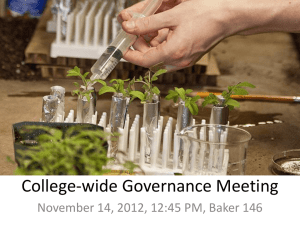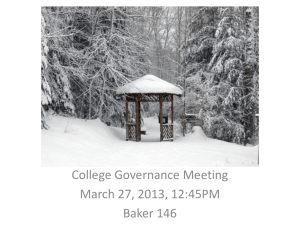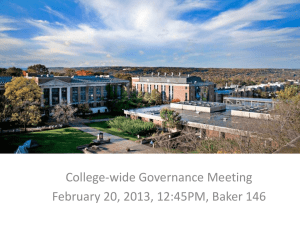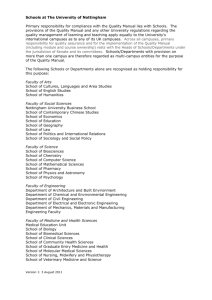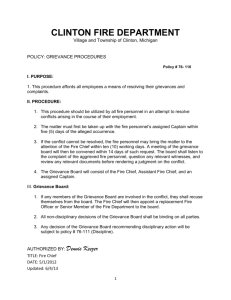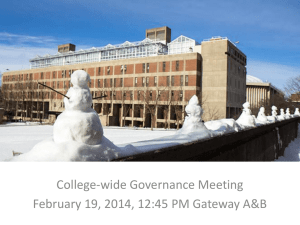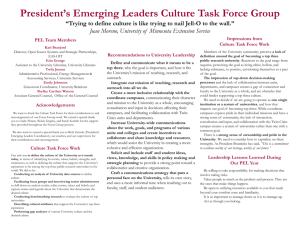College Governance
advertisement
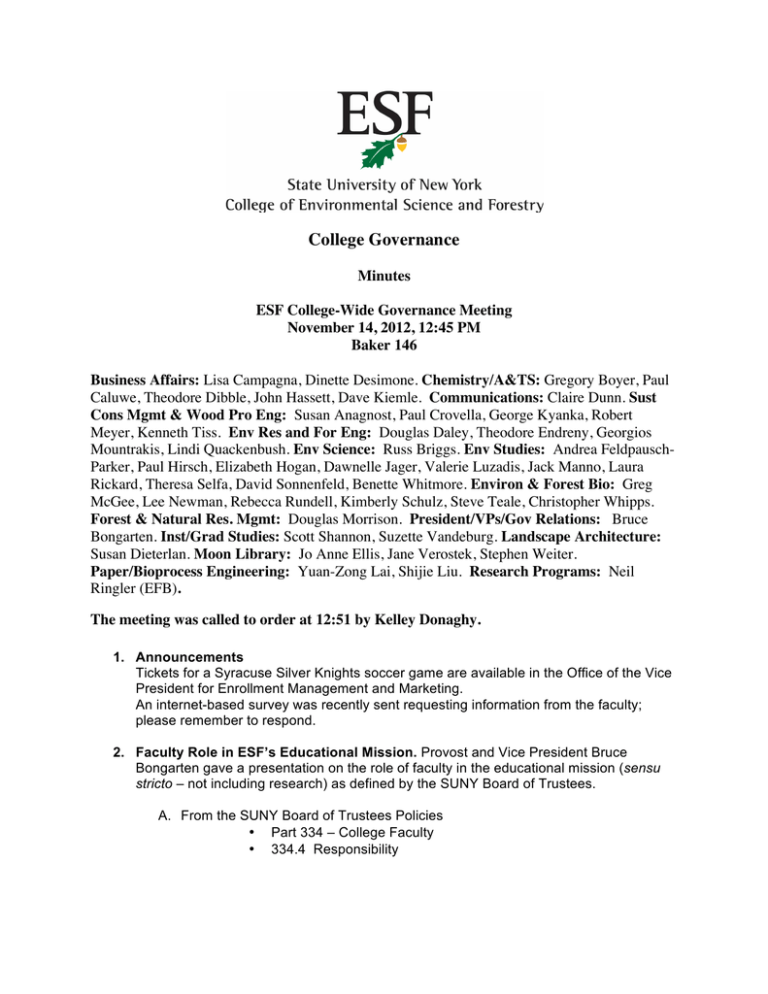
College Governance Minutes ESF College-Wide Governance Meeting November 14, 2012, 12:45 PM Baker 146 Business Affairs: Lisa Campagna, Dinette Desimone. Chemistry/A&TS: Gregory Boyer, Paul Caluwe, Theodore Dibble, John Hassett, Dave Kiemle. Communications: Claire Dunn. Sust Cons Mgmt & Wood Pro Eng: Susan Anagnost, Paul Crovella, George Kyanka, Robert Meyer, Kenneth Tiss. Env Res and For Eng: Douglas Daley, Theodore Endreny, Georgios Mountrakis, Lindi Quackenbush. Env Science: Russ Briggs. Env Studies: Andrea FeldpauschParker, Paul Hirsch, Elizabeth Hogan, Dawnelle Jager, Valerie Luzadis, Jack Manno, Laura Rickard, Theresa Selfa, David Sonnenfeld, Benette Whitmore. Environ & Forest Bio: Greg McGee, Lee Newman, Rebecca Rundell, Kimberly Schulz, Steve Teale, Christopher Whipps. Forest & Natural Res. Mgmt: Douglas Morrison. President/VPs/Gov Relations: Bruce Bongarten. Inst/Grad Studies: Scott Shannon, Suzette Vandeburg. Landscape Architecture: Susan Dieterlan. Moon Library: Jo Anne Ellis, Jane Verostek, Stephen Weiter. Paper/Bioprocess Engineering: Yuan-Zong Lai, Shijie Liu. Research Programs: Neil Ringler (EFB). The meeting was called to order at 12:51 by Kelley Donaghy. 1. Announcements Tickets for a Syracuse Silver Knights soccer game are available in the Office of the Vice President for Enrollment Management and Marketing. An internet-based survey was recently sent requesting information from the faculty; please remember to respond. 2. Faculty Role in ESF’s Educational Mission. Provost and Vice President Bruce Bongarten gave a presentation on the role of faculty in the educational mission (sensu stricto – not including research) as defined by the SUNY Board of Trustees. A. From the SUNY Board of Trustees Policies • Part 334 – College Faculty • 334.4 Responsibility o B. Elements • • • • • C. Extensions • The faculty of each college shall have the obligation to participate significantly in the initiation, development, and implementation of the educational program. Delivery of instruction Student advisement Curriculum development Curriculum assessment Academic policy development A group of faculty must be identified to fulfill responsibilities. o Typically departmental faculty assume responsibility for instruction, advisement, curriculum development and assessment o Typically, the entire college faculty have responsibility for academic policy development • Programs are “owned” by the responsible faculty as a group. o Learning outcomes for required courses are set by and assessed by the faculty group. o Scheduling of required courses is determined by the group to meet programmatic objectives. D. Whole faculty responsibilities • Development of academic policies o Curriculum o Standards • Curriculum review o Programmatic review - Quality; meeting college standards - Coordination - Need: redundancy - Cost efficiency o Course reviews - Quality; meeting college standards - Redundancy - Cost efficiency E. “Departmental” faculty responsibilities • Development of curricular programs • Assessment and revision of curricular programs • Course scheduling to facilitate timely completion of degrees • Student advisement • Allowing variances in student programs F. Administration Responsibilities • Academic policies o Provided guidance in policy development o Communicate policies o Execute/enforce policies • Curriculum development o Assure compliance with college policies o Determine availability of resources • Advisement and course scheduling • • o Provide guidance to faculty on policies and best practices o Execute administrative tasks o Assure compliance with college policies Assessment o Coordinate and provide guidance to faculty o Assure compliance with College, SUNY and Middle States policies and standards o Prepare institutional reports on assessment General o Execute tasks necessary to operate an academic enterprise in accordance with prescribed policies o Provide guidance in to faculty in fulfillment of their tasks o Assure that the interests of the College as a whole are not compromised by individual desires 3. IQAS Committee Report 2011-2012 (P. Crovella) 2011-12 members –Faculty Members: Paul Crovella (chair), Biljana Bujanovic, Charles A. Hall, Nasri Abdel-Aziz, James M. Sahn, Kavya Krishna (student), Richard Smardon, Siddarth G. Chatterjee, James Williamson 2012-13 members - Faculty Members: Paul Crovella (chair),Paul Caluwe, Susan Dieterlen, Charles A. Hall, Nasri Abdel-Aziz, James M. Sahn, Aislinn Brackman(student),PJ Connell (student), James Williamson A. End-of-course surveys • Concern • Ongoing low participation rate • Two resolutions were passed and implemented 1. longer period of time for students to respond, and real-time tracking for participation. 2. EFB and Chemistry delivered paper format during class (In response to results from a faculty survey) • Result 1. Participation dropped from ~2/3 to ~1/3 2. Paper format will not continue B. ESF Foundation Teaching Award • Concerns 1. Limited degree of student involvement in the nomination and selection process 2. Relatively low number of nominations in recent years • Resolution passed and implemented 1. Allowing for groups of students to initiate nominations, 2. Incorporation of both undergraduate and graduate representatives on the selection committee • Result The selection committee had three nominations to review. C. Academic Standards • Academic Review of Suspension Appeals o Fall: 19 suspensions, 9 appeals, 3 appeals accepted, 6 suspensions sustained • o Spring: 35 suspensions, 14 appeals, 6 appeals accepted, 8 suspensions sustained One grievance considered, One grievance adjudicated D. Grievance procedure • The process for handling an academic grievance is being reviewed - from definition to resolution. Existing Procedure Academic Grievance End of semester following semester of occurrence Informal Review Request for Formal Review 10 days Appeal 10 days Appeal 10 days Satisfactory and mutually agreeable resolution 10 days Formal Review Subcom of IQAS Recommendation 10 days Appeal of Formal Review IQAS Recommendation Accepted 10 days Final Decision President Resolved 4. Syracuse University Senate Update (K. Donaghy) Meeting – SUNY- Oswego 10/2527 A. Budget Sector Research Centers/Other Doctoral New Tool Impact • Overall Increases in State Support of 1.8% ($10.0 M) • Increases • 3 campuses • Largest increases of 11.0 % • Decreases • 5 campuses • Largest decreases of 18.6% Comprehensives • Overall Decreases in State Support of ~4.0% ($7.1 M) • Increases • 3 campuses • Largest Increase 5.2% • Decreases • 10 campuses • Largest decrease of 21.6% Technology • Overall Decreases in State Support of ~4.3% ($2.7M) • Increases • 3 campuses • Largest increase 13.2% • Decreases • 5 campuses • Largest decrease 27% Mitigating Impact Transitional Funding to be provided or received in years 1-3, additional funding options for Downstate Explored Transitional funding to be provided in years 1-3. Transitional funding to be provided in years 1-3. B. Four Resolutions • Collar (Floor) in Budget Allocation Model o Not voted on but heavily discussed • Need for Transitional Funding with the New RAT o Passed 24 to 22 (haves versus have nots??) • Necessity for Campus Presidents o Passed by voice vote • Support for Downstate Medical Center o Passed by voice vote C. Other • Law School Versus the Senate • Chancellor Cantor 5. Minutes A. Minutes from the October 17 meeting were accepted. Meeting adjourned at 1:48
